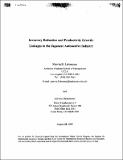| dc.description.abstract | The literature on JIT production suggests a causal link between work-in-process
inventory and manufacturing productivity. Such a connection has been described in
numerous case studies but never tested statistically. This paper uses historical data for 52
Japanese automotive companies to evaluate the inventory-productivity relationship. We
find that firms increased their productivity rank during periods of substantial inventory
reduction. More detailed tests suggest that inventory reductions stimulated gains in
productivity: on average, each 10% reduction in inventory led to about a 10% gain in
labor productivity, with a lag of about one year. Such effects were more immediate for
Toyota affiliates but undetectable for close suppliers of Nissan. These findings imply
that inventory reduction served as an important driver of process improvement for many
Japanese automotive companies, although some firms emphasized other methods. | en |
